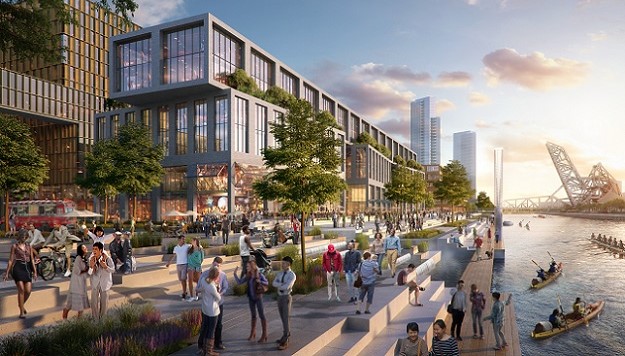
CHICAGO—Amazon put out the call two months ago for the proposals it will use to select the host city for HQ2, its new co-headquarters. Hundreds of municipalities submitted applications in hopes of attracting the project, which could employ as many as 50,000 workers. Urbanists, researchers, pundits, and publications have joined in the endless speculation on the eventual winner. And a recent survey has identified what could be the top prospects.
The team at Sperling's BestPlaces, well known for its rankings of the best places to live, collected 18 of what they termed the most reputable lists and rankings of potential locations. Using those rankings, they tallied how each location performed and from that, generated a score for each place.
Sperling calls it “the ultimate ranking of 64 locations in the US and Canada.”
Chicago lands in third, with three 1st-place nominations and eleven top-ten rankings. The Boston area was a close third, with a couple of 1st-place selections and finishing in the top ten in 12 of the 18 rankings we surveyed.
However, “in our Amazon Hyper-Ranking, the metro area of Atlanta is the clear winner, with six 1st-place selections,” the Sperling team says. “Atlanta was cited by many studies and articles as being large enough to absorb the expected 50,000 new Amazon workers, being a major air hub, and having a reasonable cost of living.”
In addition to the top three, Philadelphia, Washington, DC, Austin, Dallas, Denver, New York City and Raleigh round out the top ten. .
In the next group of metros ranked 11-20, Sperling finds Pittsburgh, Toronto, San Jose, Salt Lake City, San Francisco, Minneapolis, Portland, Nashville, Miami, and Los Angeles.
Amazon identified key factors such as a metro population greater than one million, a major airport nearby, a stable business climate, robust mass transit, a highly-educated labor pool, diverse population, low cost of living, and a high quality of life.
“Boston and other Northeast locations were identified as likely sites, but their cost of living is some of the highest in the US,” Sperling says. ”Also, these crowded cities may it difficult to accommodate an expansion as large as Amazon's.”
As the seat of US political power, not to mention Jeff Bezos' close personal connection due a recent purchase of the city's largest home and ownership of the Washington Post, Washington DC scored well with analysts.
Denver and Austin were also frontrunners. Whole Foods, Amazon's newest purchase, makes its home in Austin , while Denver has a winning combination of a vibrant economy and a great quality of life not unlike Seattle. And unlike the older, denser cities in the Northeast, Austin and Denver have plenty of room for expansion and lower costs of living than coastal regions.
“As several articles pointed out, finding a metropolitan area that meets all Amazon's criteria will difficult, if not impossible,” Sperling adds. “Some concessions will need to be made.”
Studies considered by Sperling include: Moody's Analytics; Anderson Economic Group; CNBC; Quartz; Reis; New York Times / The Upshot; Everest Group; Lyman Stone; Richard Florida; Money / CNN; New York Times Opinion; Venture Beat; CityLab; GeekWire; New York Times / Common Sense; Slate; InvestorPlace; and Denver News Tribune.
© 2025 ALM Global, LLC, All Rights Reserved. Request academic re-use from www.copyright.com. All other uses, submit a request to [email protected]. For more information visit Asset & Logo Licensing.








